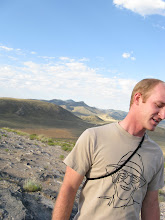This morning, an interesting study came upon the BYU home page that links relationships to survival rates. There's a short summary of it here http://news.byu.edu/archive10-jul-relationships.aspx
Here's a quote from that same story:
"'We take relationships for granted as humans – we’re like fish that don’t notice the water,' Smith said. 'That constant interaction is not only beneficial psychologically but directly to our physical health.'"
I feel like this study validates a lot of the things I've been thinking about lately. I keep noticing things that suggest pretty strongly to me that in many ways we really live for each other, whether or not we are aware of it.
Here is a quote from a commencement speech by David Foster Wallace:
 "There are these two young fish swimming along, and they happen to meet an older fish swimming the other way, who nods at them and says, 'Morning, boys, how's the water?' And the two young fish swim on for a bit, and then eventually one of them looks over at the other and goes, 'What the hell is water?'"
"There are these two young fish swimming along, and they happen to meet an older fish swimming the other way, who nods at them and says, 'Morning, boys, how's the water?' And the two young fish swim on for a bit, and then eventually one of them looks over at the other and goes, 'What the hell is water?'"The interesting thing about this seemingly coincidental link is that the speech Wallace gave is on a topic very similar to that of the study. The theme might be stated as something like: how people choose to relate to other people. The topic is a big part of the reason why Wallace's writing interested me so much in the first place (http://www.mcsweeneys.net/dfw/memories.html). As I take it, his work is in some ways a reaction to the "postmodern" literary problem of becoming totally self-centered, perhaps to the point of solipsism (Oxford English Dictionary "solipsism: The view or theory that self is the only object of real knowledge or the only thing really existent.")
Wallace described solipsism as an extremely sad philosophy.
The nice thing about blogs is that I don't have to link all of these thoughts together in a completely coherent way. I can make all sorts of wild, unsupported statements and just let my intuition do the publishing. Maybe someone else will do the research. Maybe I'll even hear about it.
So, here's some more to think about. My dad is getting older. He turned 50 pretty recently, and I've noticed how he has become more concerned with preserving his health.We've had a few conversations on this subject, and he believes pretty strongly that dementia and a whole load of other mental issues that are becoming more common in old age are linked to the lack of psychological demands made on people who are disconnected from the people around them. Divorce continues to be extremely common, and many people don't have good relationships with their children. These two issues alone often cut people off from what were traditionally the most important things in life, and I don't think Facebook will make up for them.


2 comments:
you should read this book: "lonliness: human nature and the need for social connection" by John T cacioppo. it's good. please read it.
finally got around to reading this post.
my grandpa worked till he was 90 and he's about 99 now and still pretty sharp.i think early retirement with plans just to golf for the rest of your life is a prescription for dementia.
it is interesting that facebook's selling point is to connect while it seems to do exactly the opposite.
Post a Comment